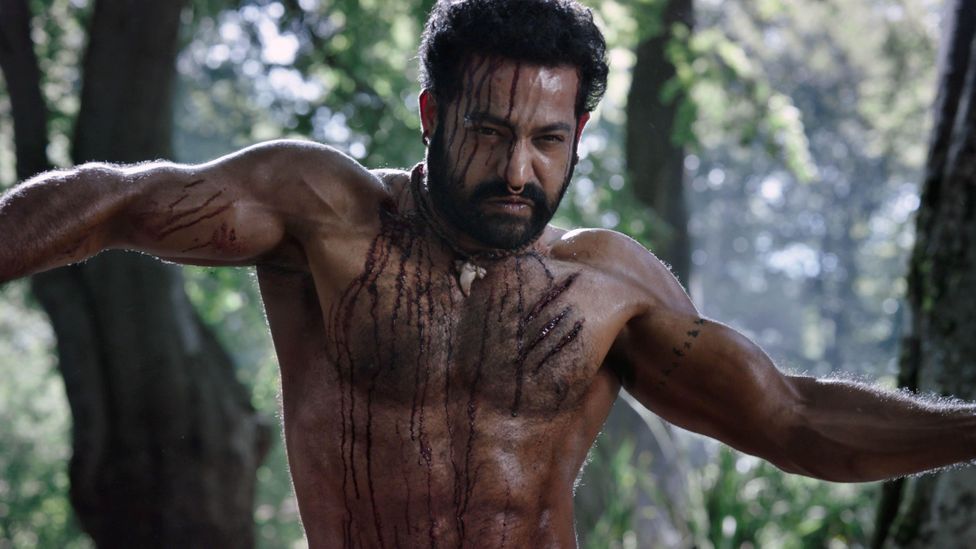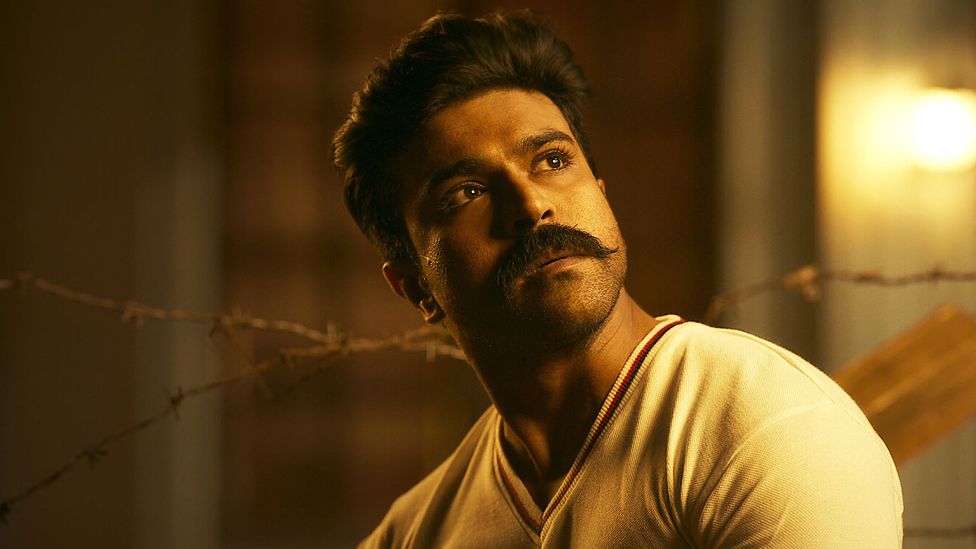“Not salsa, not flamenco, my brother. Do you know?,” asks a handsome, bearded Indian of a befuddled-looking Englishman. Without waiting for a response, and accompanied by his friend, he breaks into a song and dance that is one of the most high-octane, foot-stomping numbers to grace a cinema screen.
More like this:
– A shocking moment in Oscars history
– Will this WW1 film win best picture?
– A new rom-com upending Western myths
Using only their wide smiles and elastic suspenders as props, Alluri Sitarama Raju (Ram Charan Teja) and Komaram Bheem (NT Rama Rao Jr) kick up a mini dust storm with their energetic and perfectly synchronised steps, their elegant European suits in sharp contrast to their vigorous moves. The villainous Englishman – we know him only as Jake – calls their performance “disgusting” and “filthy” before joining in a dancing competition, only to drop to the ground with exhaustion. Raju and Bheem, meanwhile, dance on and on, in triumph. The song is the very catchy Naatu Naatu
“Naatu” in this song simply refers to something uber-local or , as opposed to the foreign, non-Indian salsa and flamenco. The lines from the song are an ode to all that is earthy and rustic, like the sharp bite of a green chilli that gives you a high, or the throbbing beat of a drum that makes your heart beat faster.
And the song is a metaphor for the film itself: the two naatu freedom fighters taking on the might of the British Empire (represented here by a nasty official called Governor Scott Buxton and his equally nasty wife Catherine, along with a bunch of junior officers who frequently slap and punch the locals), bringing it to its knees. It is a song about redemption, about David dancing the giant Goliath straight out of the arena.
Given its historically resonant and emotional storyline, RRR’s resounding success in India is hardly surprising. However, its popularity with global audiences – winning a place on several “best films of 2022” lists – is unprecedented. It has become the highest grossing Indian film ever in Japan, since its release in late October. The New Yorker, in an interview with the film’s director SS Rajamouli – who won best director at the New York Film Critics Circle Awards in January – described it as “[a] joyously over-the-top action-fantasy,” while Rolling Stone declared it the “best – and most revolutionary – blockbuster of 2022”.
The film owes its success, in no small part, to its musical centrepiece, which Variety called “a movie-music adrenaline blast”. Naatu Naatu made Indian cinema history by winning the Golden Globe for best original song in January, defeating major contenders like Rihanna, Taylor Swift and Lady Gaga. With an Oscar nomination for best original song, and a slated performance at the Academy Awards ceremony this Sunday, interest in the song is at an all-time high.
Social media phenomenon
While viewers in India have been humming the words and dancing to the tune, do they think this is unique or extraordinary? Perhaps not. Anand Krishnamoorthi, a sound designer working on south Indian films, while calling this song “trippy and enjoyable,” tells BBC Culture; “As Indian moviegoers, we have definitely heard better, whereas for an audience not so familiar with our kind of films, it may be fresh.” But there is no doubt about its impact. As Reem Khokhar, an Indian writer who set herself a dance challenge for an entire year, tells BBC Culture; “There was a raw, frenetic energy that just exploded on-screen, I haven’t enjoyed watching a song so much in a long time.”
Krishnamoorthi is, however, delighted that an Indian song has been nominated for best song at the Oscars. This has only happened once before, when composer AR Rahman won for Jai Ho from Slumdog Millionaire (2009). But that film was not strictly Indian, having been directed by Danny Boyle, along with a mostly British crew.
Krishnamoorthi explains that the term Bollywood itself suggests that there is nothing exceptional about Indian cinema, that it is just a cheap copy of Hollywood. “It is true that while our industry is varied and nuanced, many aspects of our filmmaking are still derivative. But the one area where we are original and have something unique to offer to the world is our music and dance. Everything else the audiences have seen elsewhere, so it makes sense that such a song would transcend linguistic barriers,” he says.
Just like RRR as a whole, the Naatu Naatu sequence is larger than life, filmed in front of Ukrainian President Volodymyr Zelensky’s grand official residence in Kyiv in 2021. With its effervescent beats and infectious energy, it’s a strong favourite for the best original song Academy award. The “hook step” became an overnight TikTok phenomenon, with people trying to recreate a tiny part of the 4.5min dance sequence on social media, aided by detailed tutorials such as this one by the choreographer Prem Rakshith. This has helped propel not just the song but the film itself into the consciousness of US audiences.

In RRR, two naatu freedom fighters take on the might of the British Empire (Credit: TCD / Prod.DB / Alamy)
Having discovered this song on Instagram (which in turn prompted her to try the dance and then watch the film at the cinema), Khokhar explains how important it is today for songs to have that memorable 15-20 second sequence that makes songs go viral on the platform – in this case the Naatu Naatu chorus. Indeed, there are videos of the audience in Los Angeles’ Chinese Theatre getting up and dancing to the song during a screening in January as part of Beyond Fest.
A ‘paradigm shift’
RRR’s storyline is fairly linear and simple, even simplistic; heroes and villains are all painted in broad brush strokes. The anti-colonial message is strong and the story of the grassroots revolution exhilarating. But the film is not without its detractors, who have pointed out several critical flaws. This includes the use of religious iconography to drive the Hindutva agenda – potentially stoking the flames of nationalistic pride in a country already weighed down by its right-wing politics – and the appropriation of tribal culture. Of more concern is the casteism that runs throughout, with Bheem – who comes from a lower caste – bowing to the supposedly superior intellect of upper-caste Ram. As this detailed critique in Vox points out, “while it might be an exciting romp, the film doesn’t offer any reprieve from the upper-caste vision that brought us here.”
The film may show Indians vanquishing their British oppressors, but Krishnamoorthi feels that there is an uncomfortable racial element, even in the context of Western audiences’ enthusiasm. “Indian films are still viewed outside as animals in a zoo, they are interesting only because of their exoticism and not relatability. So, when they [Western audiences] go to watch one, there is already that expectation of an exotic spectacle, and this film dished it out in dollops.”

The heroes and villains in RRR are all painted in broad brush strokes (Credit: Netflix)
That being said, the attention and acclaim being showered on RRR is heartening for one reason. Up until now, Bollywood – the Hindi film industry based in Mumbai – has been, for the rest of the world, a byword for the entirety of Indian cinema. The success of this film from the South Indian – specifically Telugu – film industry, reinforces the growing trend of movies from other parts of the country slowly making their mark on not just Hindi-speaking North Indian audiences, but also globally. AR Rahman’s congratulatory tweet about a “paradigm shift” after the song’s Golden Globes win was a nod to this change. And Naatu Naatu has a good chance of a win at the Oscars too, because this gives the Academy an opportunity to show its new-found love for representation and diversity.
And there is no denying that this song-and-dance sequence absolutely brims with joy and life. As Jenny, the sole English character sympathetic to the Indian cause in the film, tells Bheem in one scene, “It was overwhelming. The beat pulsating through your body, the flying feet, the flashing eyes!”